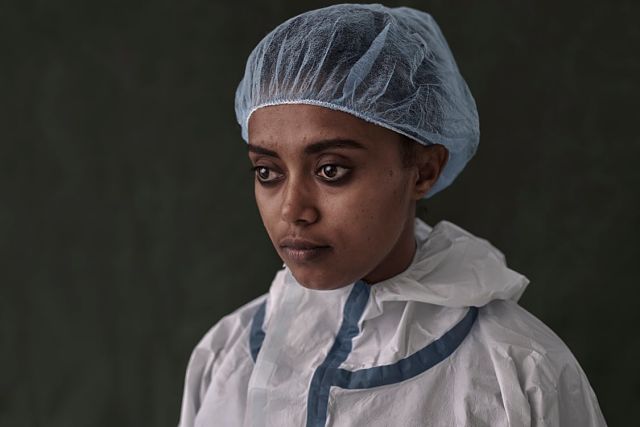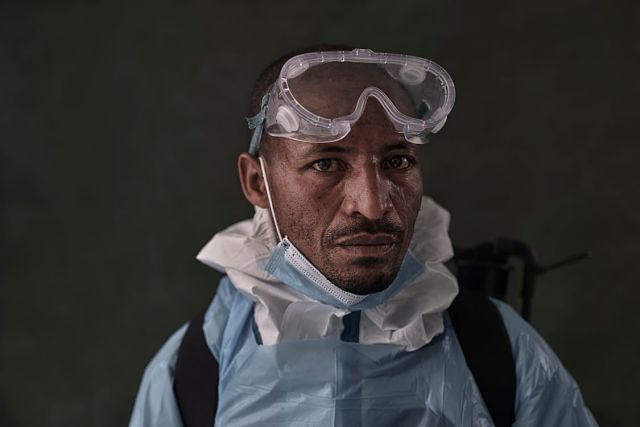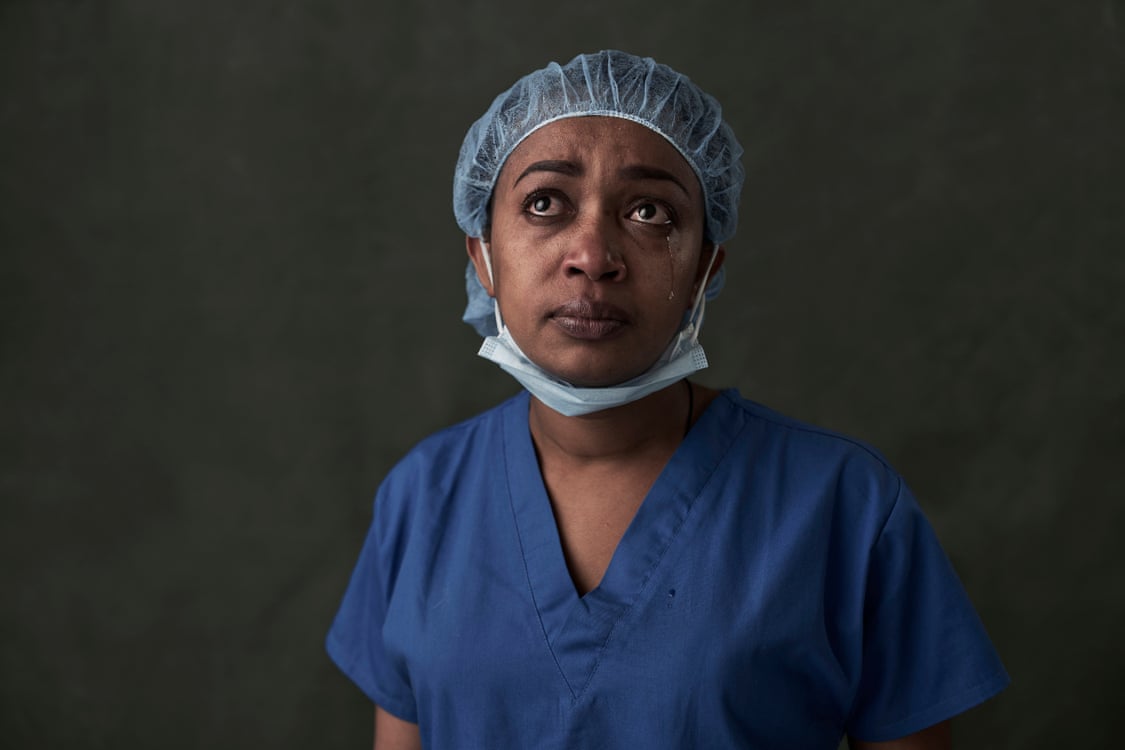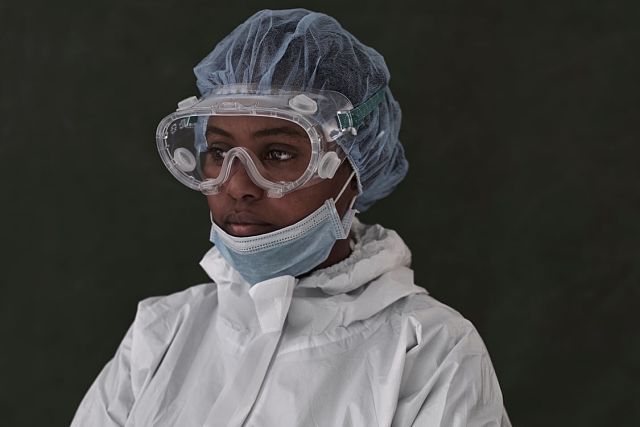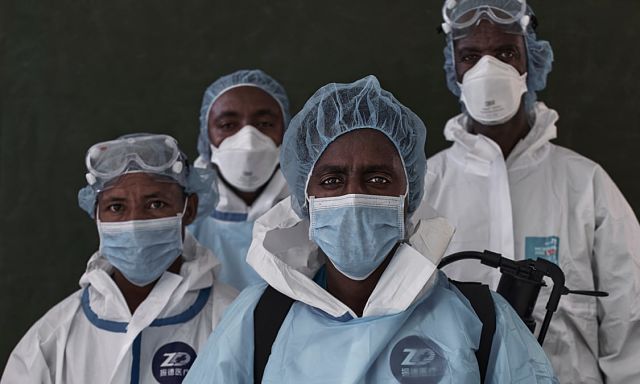 Frontline workers at the Eka Kotebe hospital. (Photo by Yonas Tadesse)
Frontline workers at the Eka Kotebe hospital. (Photo by Yonas Tadesse)
The Guardian
By Yonas Tadesse
Yonas Tadesse is an Ethiopian photographer based in Addis Ababa who has been documenting doctors and emergency workers fighting coronavirus since the beginning of the outbreak. This series focuses on the taskforce at the Eka Kotebe hospital in Addis Ababa.
The first case of Covid-19 in Ethiopia was reported on 13 March, when a team of first responders took in a 48-year-old Japanese man. Having never seen anything like his condition, they did not know what to prepare for, and thus started their new normal of battling the coronavirus in Ethiopia.
Doctors, nurses, janitors, security guards and drivers donned hats they had never dreamed of wearing as they worked to develop systems and techniques to minimise the damage from the virus – often at the cost of their health, their home lives, their reputations, and sometimes their lives.
My name is Dr Kalkidan, I was the first person to admit the first Covid-19 positive patient from Japan.
It was sudden. We weren’t really expecting patients. We were told to prepare the facility. I didn’t bring a change of clothes. I came to do the routine drills. I was terrified. I used to say I wasn’t scared, but I thought to myself about how I must love my life.
We had to take his blood ourselves, which meant we had to touch him. I was uncomfortable leaving because the man kept coughing constantly and saying he was suffocating. I wanted to auscultate, but that was not an option. I was just scared.
I talked to friends I’d left on bad notes. I couldn’t talk to my mum. I only talked to my sister. All the regrets and mistakes in life come rushing at you in times like this. I have pre-existing issues with depression and anxiety and it took a lot for me to be back here. I was very upset.
I’m not saying we have to be reckless, but I think we need to have some faith. I don’t think we needed to be that daunted. I think we exaggerated too much going in at first. I mean, God works here too, right? I don’t think we needed to be that stressed. I think we’ve compromised a lot out of fear.”
My name is Paulos Seid. I was born and raised in a town called Elebabor, Gore. I am married and a father of a son and twin daughters. I’d worked at Kotebe hospital as a security guard for five months when the coronavirus pandemic was reported in our country.
During the preparations to battle the virus, there was a big shortage of manpower, so I was asked to carry the responsibility of ‘sprayer’. I did not hesitate. Every time I do the job, I feel that I’m eradicating the virus, so I feel proud.
But this job has cost me some things. Friends who would normally join me for lunch have come to hate me. They beg me in God’s name not to go near them. It breaks my heart, but the work I do gives me a sense of purpose. I can’t wait for all this to end so I can see my children.”
My name is Makeda. The worst day so far was when we lost our first patient.
Mothers are leaving their children behind, families are scattering because of this – you can’t bury your dead.
We’re losing our joy. From day one, when I think of coronavirus, I think of my family, of people I love. It makes me think I have no guarantee that my mother will not be in this hospital bed next. Or my friends. It’s very painful.
This might be the first time in my life I thought about my country. But I will continue to serve until my last minute alive because I am here for a reason.”
My name is Dr Rediet. One time, I was doing rounds with the doctors and transferring patients. After we were done, we heard the patients asking for help. I was doffing. I’d almost gotten my apron off. We ran to the patients and realised Ato Tesfaye did not have a pulse, no cardiac beat, no radial pulse. I fixed the bed for him and we started doing CPR. As this was an emergency, we were required to do CPR on a salvageable patient. I was the one still wearing full protective gear so it was OK for me to give CPR. We did two cycles of chest compression and we were able to bring him back. We were lucky because we heard the call for help.”
Read more and see the rest of the photos at theguardian.com »
—
Related:
Ethiopia Coronavirus Cases Reach 60,784 (LATEST UPDATE)
‘Covid Has Made Me Wonder: Am I Really an Entrepreneur?’ – Kibret Abebe
Join the conversation on Twitter and Facebook.





